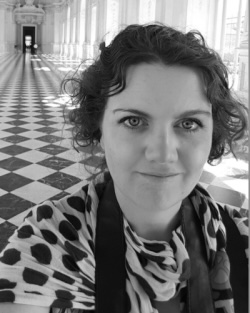
Katrina Grant and Marni Williams will present on research and publishing in the AI-era, at this year's Fantastic Futures conference at the National Film and Sound Archive in Canberra.
On Friday 18 October, the Power Institute's Marni Williams and Katrina Grant will present some of their recent thinking and research on digital publishing and research methods, as part of the "Fantastic Futures" conference.
Read more about Marni and Katrina's presentation below, and visit the Fantastic Futures website to learn more about the conference, and to register.
From Small Data to Big Knowledge Networks: Preparing Research Practices and Publishing Infrastructure for the AI-era
Research in the humanities has always had a data problem, or, more accurately, a data-sharing problem.
While collection data has opened up and is now linking up, research data often remains hidden behind prose, with outputs still heavily skewed towards monographs, journals and other traditional forms of publishing. These final outcomes are also often behind paywalls and are challenging to access for those working in the broader GLAM sector, let alone various publics. This has created a disconnect between the rich data being collected and created by researchers (photos, video, notes, observations, maps, models etc) and what can actually be accessed, reused, aggregated and linked. This problem is set to become more acute as tools and methods that embrace big data, such as AI and machine learning, begin to inform curatorial practice and the broader cultural sector.
As researchers based within an institute dedicated to producing, publishing and sharing research on art history and visual culture, we have realised that much of the rich, verifiable materials and nuanced information on collections and visual culture is not ready to be used in data sets for things like an LLM or a text-to-image model. As the sector prepares to embrace the potential for specialised AI and ML tools and methods, there is a pressing need to connect the complex ideas and diverse data being produced by researchers in disciplines such as art history, anthropology, media studies, with our cultural collections. Further, as the sector begins to critique models being produced by large commercial organisations, the many small, slowly accrued datasets produced by researchers, and transparent frameworks around them, might begin to provide alternative training sets to those scraped from internet feeds.
One way to address this challenge and opportunity is to change the way we practice and publish academic research on collections and cultural heritage. As part of a new multi-year project–the Visual Understanding Initiative–a group of publishers, art historians and digital humanists at the Power Institute for Art and Visual Culture at the University of Sydney are developing new approaches to research that allow scholars, artists, community knowledge holders, and museum partners to produce rich data sets, annotated objects and data visualisations, and to communicate them beyond the codex as part of an open publishing infrastructure based on interconnected nodes.
Although this project is at its inception, we hope it will allow humanities researchers and the cultural sector to develop practices for data collection and interoperability that will make it easier to connect with future potential for the development of tools and methods using AI. And that, in the tradition of critical humanities thinking, it will also have the capacity to encourage us collectively explore the possibilities and critique the limitations of AI in ways our sector does best: through transparent, critical engagements with a vast range of cultural materials.
This paper will highlight key projects from the Visual Understanding Initiative’s three main areas of focus: Critical Looking–How digital infrastructure can encourage slow looking and support small data set development with the Image Annotation Workbench; Indigenous Ways of Seeing–How the Digital Keeping Places project is working on data sovereignty and cultural safety; Visualising Ideas–How Power Publications’ Drupal-based platform will encourage more fluid connections between generative research practices and the publishing of research, ideas and data.
People

Marni Williams
Marni WIlliams is the Publications Manager at the Power Institute. She is editor, writer and arts administrator with experience spanning visual arts, trade, narrative non-fiction, careers and education publishing, and currently completing at PhD at the Australian National University.

Katrina Grant
Katrina Grant is a Reseach Fellow in Visual Understanding at the Power Institute. She is an art historian with a background in digital art history and digital humanities. Her research is based in the fields of Digital Art History and the application of visualisation and mapping technologies to art history research, as well as the way that digital transformation is unfolding in the galleries and museums sector. She is an expert on the representation of landscape in early modern Europe and the visual cultures performance and spectacle. She is on the executive of the Art Association of Australia and New Zealand. She is an Honorary Senior Lecturer in Art History and Adjunct Fellow of the Humanities Research Centre both at the ANU.
